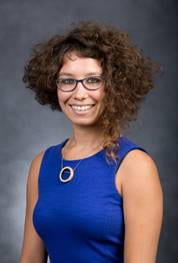PROVIDENCE COLLEGE’S DR. THEA RIOFRANCOS NAMED WINNER OF 2020 ANDREW CARNEGIE AWARD

Providence, RI – May 12, 2020– Providence College (PC) today announced that political science professor Thea Riofrancos has been named to the 2020 class of Andrew Carnegie Fellows.by the Carnegie Corporation of New York. The Carnegie Corporation has selected 27 distinguished scholars and writers from more than 300 nominations for this honor. Each winner will receive $200,000 in philanthropic support for high-caliber scholarly research in the social sciences and humanities that addresses important and enduring issues confronting our society.
Dr. Riofrancos has been an assistant professor of Political Science at PC since 2015. Previously, she was a Visiting Fellow at the Kellogg Institute for International Studies (University of Notre Dame), and held a one-year appointment as a visiting scholar at the Facultad de Ciencias Sociales (FLACSO) in Quito, Ecuador. She received her Ph.D. in political science from the University of Pennsylvania in 2014, and her B.A. from Reed College in 2006.
Providing one of the most generous research stipends of its kind, the Andrew Carnegie Fellows Program was established in 2015. The program represents an overall investment of $38 million in some 200 recipients whose scholarly research spans such subjects as U.S. democracy, the environment, technological and cultural evolution, and international relations. The criteria prioritize the originality and potential impact of a proposal, as well as a scholar’s capacity to communicate the findings with a broad audience.
“The pursuit of knowledge and the generation of ideas were critically important to the Corporation’s founder, Andrew Carnegie, whose mission is especially relevant today as our society confronts problems that have been greatly exacerbated by COVID-19,” said Vartan Gregorian, president of Carnegie Corporation of New York and president emeritus of Brown University. “Fellows from earlier classes are actively addressing the coronavirus through their research on topics such as its impact on rural America, government authority during a pandemic, and ways in which different countries address infectious diseases. The work of this exemplary Class of 2020 will also be of service across a range of other crucial issues.”
President Gregorian noted that this year’s 27 fellowships were selected from 322 nominations. The class is made up of 15 women and 12 men. The program seeks to include emerging and established scholars from across the country. In this year’s class, 14 are from public institutions of higher education, 12 are from private colleges or universities, and one is a journalist working with a think tank.
The latest class of fellows was selected by a distinguished panel of 17 jurors comprised of scholars and academic and intellectual leaders from some of the nation’s most prominent educational institutions, foundations, and scholarly societies. Seven of the jurors are either current or former university presidents.
“I am greatly impressed by the breadth and depth of the proposals from this year’s nominees and their potential for progress. For the jury and for me, the selection process was deeply gratifying and inspiring,” said Susan Hockfield, chair of the Andrew Carnegie Fellows Program jury since 2015, president emerita of the Massachusetts Institute of Technology, and a former member of the Carnegie Corporation of New York board of trustees. “As we respond to the many disruptions caused by COVID-19, we must not lose sight of the necessity of solving both today’s and the world’s persistent challenges. The complex solutions required for these difficult problems require more than the best of science and engineering; they must also incorporate perspectives and insights from the humanities and social sciences.”
Every year, more than 600 nominators, including heads of independent research institutes and societies, university presidents, leaders of some of the nation’s preeminent think tanks, directors of major university presses, as well as editors of leading newspapers and magazines, are invited to recommend up to two individuals for the fellowships. All proposals undergo a preliminary, anonymous evaluation by leading authorities in the relevant fields. The top proposals are then forwarded to the members of the jury for a final review and selection.
The award is for a period of up to two years and its anticipated result is a book or major study. Read more about the Class of 2020, the Andrew Carnegie Fellows Program, the work of past honorees, the criteria for proposals, and a historical timeline of scholarly research supported by the Corporation.
Founded in 1917, Providence College is the only college or university in the United States administered by the Dominican Friars. The Catholic, liberal arts college has an undergraduate enrollment of approximately 4,000 students and offers degrees in 52 academic majors and 38 minors. Since 1997, Providence College consistently has been ranked among the top five regional universities in the North according to U.S. News & World Report’s “America’s Best Colleges.”
-30-





